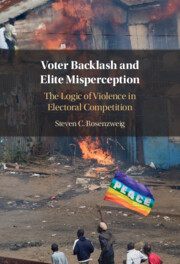Book contents
- Frontmatter
- Dedication
- Contents
- Figures
- Tables
- Preface
- Acknowledgements
- 1 Introduction
- 2 Election-Related Violence in Kenya and around the World
- 3 Theorizing Election-Related Violence: Toward a Theory of Elite Misperception
- 4 Violence and Election Outcomes
- 5 How Violence Affects Voting: Coercion, Persuasion, and Backlash
- 6 Elite Misperception and Election-Related Violence
- 7 Voter Backlash, Elite Misperception, and Violence beyond Kenya
- 8 Conclusion
- Appendix A Sampling Strategy for the Survey in Nakuru, Kisumu, and Narok
- Appendix B Supplementary Analyses
- Appendix C Candidate Vignettes and Outcome Questions
- Appendix D Politician Information Experiment Memo and Contact Scripts
- References
- Index
3 - Theorizing Election-Related Violence: Toward a Theory of Elite Misperception
Published online by Cambridge University Press: 18 May 2023
- Frontmatter
- Dedication
- Contents
- Figures
- Tables
- Preface
- Acknowledgements
- 1 Introduction
- 2 Election-Related Violence in Kenya and around the World
- 3 Theorizing Election-Related Violence: Toward a Theory of Elite Misperception
- 4 Violence and Election Outcomes
- 5 How Violence Affects Voting: Coercion, Persuasion, and Backlash
- 6 Elite Misperception and Election-Related Violence
- 7 Voter Backlash, Elite Misperception, and Violence beyond Kenya
- 8 Conclusion
- Appendix A Sampling Strategy for the Survey in Nakuru, Kisumu, and Narok
- Appendix B Supplementary Analyses
- Appendix C Candidate Vignettes and Outcome Questions
- Appendix D Politician Information Experiment Memo and Contact Scripts
- References
- Index
Summary
Chapter 3 summarizes existing theories of election-related violence and introduces a theory of violence as a result of elite misperception. Existing theories rely upon the assumption that politicians choice of violence as an electoral tactic is based on an accurate assessment its relative costs and benefits. The theory of elite misperception, on the other hand, builds on two insights: (1) that voter backlash against violence is substantial and can cost politicians votes and (2) politicians frequently misjudge voter preferences – including with respect to violence – which can lead them to overestimate its benefits as an electoral tactic. The theory points to the difficulties politicians face in accurately assessing the impact of electoral tactics, as well as to the prevalence of cognitive biases that can cause them to misinterpret what information they have. It also highlights the importance of founding elections in determining which electoral tactics – violence included – are considered effective and worthy of emulation. With these insights in mind, the theory explains the incidence and persistence of election-related violence as a result of politicians misperceptions about voter preferences and the effects of violence on voting rather than the objective electoral benefits that violence provides.
Keywords
- Type
- Chapter
- Information
- Voter Backlash and Elite MisperceptionThe Logic of Violence in Electoral Competition, pp. 44 - 74Publisher: Cambridge University PressPrint publication year: 2023



